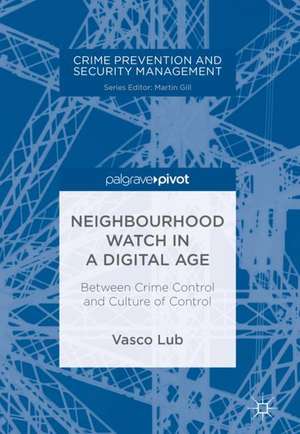Neighbourhood Watch in a Digital Age: Between Crime Control and Culture of Control: Crime Prevention and Security Management
Autor Vasco Luben Limba Engleză Hardback – 2 noi 2017
Crucially, this study raises questions about how the increasing popularity of community crime prevention in a digital age should be framed: as a welcome civic contribution to crime control, or as a social phenomenon adding to an undesirable culture of control. Criminologists, city officials, policy makers and anyone studying neighbourhood activism will find this a fascinating work on crime control.
| Toate formatele și edițiile | Preț | Express |
|---|---|---|
| Paperback (1) | 412.30 lei 6-8 săpt. | |
| Springer International Publishing – 25 aug 2018 | 412.30 lei 6-8 săpt. | |
| Hardback (1) | 418.45 lei 6-8 săpt. | |
| Springer International Publishing – 2 noi 2017 | 418.45 lei 6-8 săpt. |
Din seria Crime Prevention and Security Management
- 17%
 Preț: 361.49 lei
Preț: 361.49 lei -
 Preț: 348.40 lei
Preț: 348.40 lei -
 Preț: 486.60 lei
Preț: 486.60 lei -
 Preț: 382.18 lei
Preț: 382.18 lei -
 Preț: 391.22 lei
Preț: 391.22 lei -
 Preț: 390.25 lei
Preț: 390.25 lei -
 Preț: 419.21 lei
Preț: 419.21 lei -
 Preț: 384.31 lei
Preț: 384.31 lei - 18%
 Preț: 727.18 lei
Preț: 727.18 lei -
 Preț: 383.93 lei
Preț: 383.93 lei - 15%
 Preț: 638.89 lei
Preț: 638.89 lei - 18%
 Preț: 952.09 lei
Preț: 952.09 lei -
 Preț: 389.70 lei
Preț: 389.70 lei - 15%
 Preț: 516.15 lei
Preț: 516.15 lei -
 Preț: 392.60 lei
Preț: 392.60 lei -
 Preț: 383.71 lei
Preț: 383.71 lei - 15%
 Preț: 702.87 lei
Preț: 702.87 lei - 15%
 Preț: 643.99 lei
Preț: 643.99 lei -
 Preț: 453.60 lei
Preț: 453.60 lei -
 Preț: 391.61 lei
Preț: 391.61 lei - 18%
 Preț: 788.54 lei
Preț: 788.54 lei -
 Preț: 395.85 lei
Preț: 395.85 lei -
 Preț: 419.59 lei
Preț: 419.59 lei - 15%
 Preț: 697.65 lei
Preț: 697.65 lei -
 Preț: 385.08 lei
Preț: 385.08 lei -
 Preț: 477.61 lei
Preț: 477.61 lei -
 Preț: 385.84 lei
Preț: 385.84 lei -
 Preț: 419.06 lei
Preț: 419.06 lei -
 Preț: 385.84 lei
Preț: 385.84 lei - 18%
 Preț: 782.42 lei
Preț: 782.42 lei -
 Preț: 395.47 lei
Preț: 395.47 lei -
 Preț: 452.40 lei
Preț: 452.40 lei - 18%
 Preț: 1004.81 lei
Preț: 1004.81 lei -
 Preț: 384.48 lei
Preț: 384.48 lei - 15%
 Preț: 706.48 lei
Preț: 706.48 lei -
 Preț: 388.72 lei
Preț: 388.72 lei
Preț: 418.45 lei
Nou
Puncte Express: 628
Preț estimativ în valută:
80.08€ • 86.96$ • 67.27£
80.08€ • 86.96$ • 67.27£
Carte tipărită la comandă
Livrare economică 23 aprilie-07 mai
Preluare comenzi: 021 569.72.76
Specificații
ISBN-13: 9783319677460
ISBN-10: 3319677462
Pagini: 150
Ilustrații: XIII, 150 p. 7 illus., 4 illus. in color.
Dimensiuni: 148 x 210 mm
Greutate: 0.35 kg
Ediția:1st ed. 2018
Editura: Springer International Publishing
Colecția Palgrave Macmillan
Seria Crime Prevention and Security Management
Locul publicării:Cham, Switzerland
ISBN-10: 3319677462
Pagini: 150
Ilustrații: XIII, 150 p. 7 illus., 4 illus. in color.
Dimensiuni: 148 x 210 mm
Greutate: 0.35 kg
Ediția:1st ed. 2018
Editura: Springer International Publishing
Colecția Palgrave Macmillan
Seria Crime Prevention and Security Management
Locul publicării:Cham, Switzerland
Cuprins
PART I. Neighbourhood Watch in the Netherlands: Introduction and Figures.- 1. The rise of Community Crime Prevention.- 1.1. The Securitization of Society.- 1.2. Themes of the Present Study.- 1.3. Research Methodstart-up Problems and Lessons Learned.- 5.3. Conclusions.- 6. Watch Group 3.- 6.1. Police Support Collapses.- 6.2. Big City Problems.- 6.3. Conclusions.- 7. Watch Group 4.- 7.1. Creating Critical Mass.- 7.2. Tensions in the Team.-7.3. Conclusions.- PART III. Conclusions and Discussion.- 8. Conclusions.- 8.1. General Findings about Neighbourhood Watch in the Netherlands.- 8.2. Influence and Impact of Watch Groups.- 8.3. The Interaction With Professional Forms of Surveillance and Law Enforcement.- 8.4. Moral Implications of Neighbourhood Watch in Light of Securitization and Digilantism.- 9. Discussion.- 9.1. Between Crime Control and Culture of Control.- 9.2. Points of Interest for Western Governments and Active Citizens.
Notă biografică
Vasco Lub is an independent Dutch scholar (affiliated with Erasmus University Rotterdam) who works at the intersection of sociology and policy research. He publishes both nationally and internationally on urban issues, social policy, neighbourhood safety, civic participation and social research methodology.
Textul de pe ultima copertă
Drawing on data from 340 municipalities in the Netherlands as well as ethnographic fieldwork, this book presents original research on neighbourhood watch groups to illustrate how their actions contribute to collective efficacy and lower crime levels. Technological developments like social media and smartphones have changed the landscape of coproduction in public safety, and this book addresses the resultant issues involved with creating effective policy. While digital innovations and securitization have made neighbourhood watch groups effective, they have simultaneously increased the risk of vigilantism, and Lub reveals how stigmatization, ethnic profiling and excessive social control are very real issues, especially in suburban middle-class districts.
Crucially, this study raises questions about how the increasing popularity of community crime prevention in a digital age should be framed: as a welcome civic contribution to crime control, or as a socialphenomenon adding to an undesirable culture of control. Criminologists, city officials, policy makers and anyone studying neighbourhood activism will find this a fascinating work on crime control.
Caracteristici
Explores the digital surveillance revolution and how social media and smartphones have changed the landscape of public safety Draws on original data to examine how neighbourhood watch groups have developed in the Netherlands and how their actions contribute to lower crime levels Questions whether community crime prevention should be seen as a welcome civic instrument or a phenomenon adding to an undesirable culture of control
